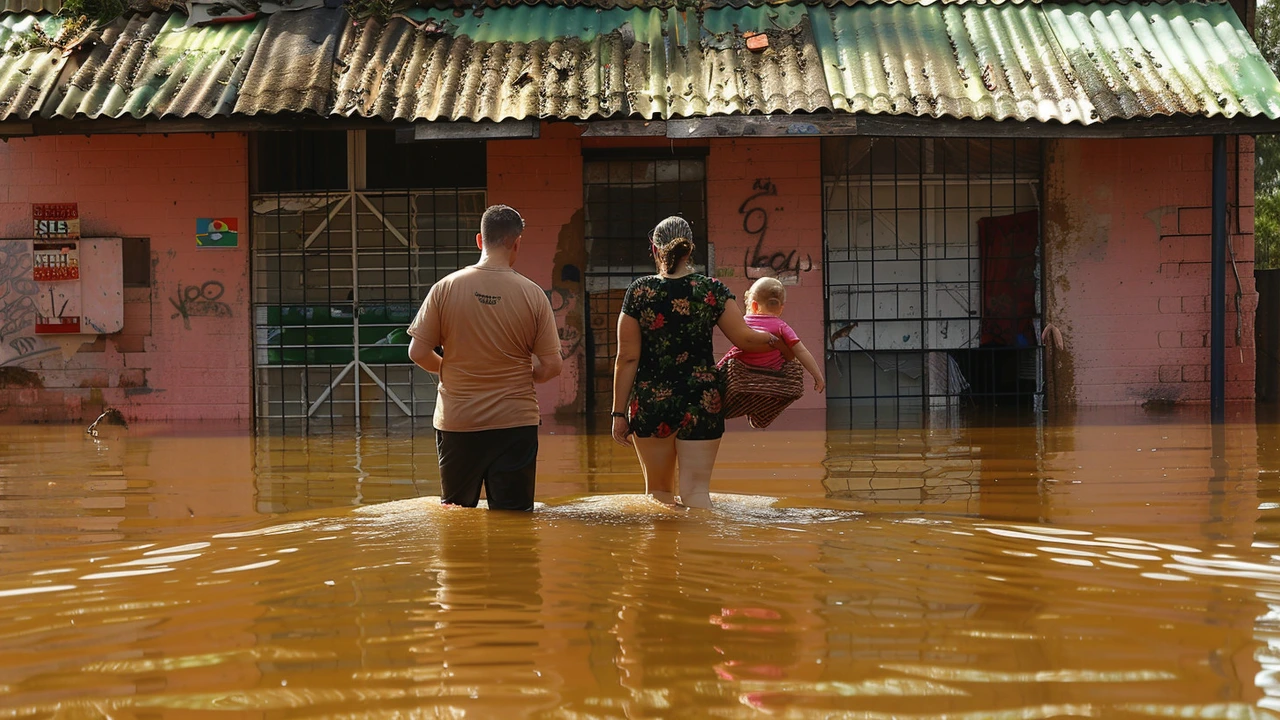Catastrophic Flooding in Brazil's Rio Grande do Sul: Impact and Response to Record-Breaking Deluge

Unprecedented Flood Crisis in Rio Grande do Sul
The tranquil rhythm of life in Rio Grande do Sul, Brazil, was dramatically disrupted recently as the region confronted its worst flooding in decades. Heavy rainfall has led to a catastrophic deluge, inundating large areas, disrupting lives, and creating scenes of despair and destruction. This disaster has not only claimed lives but also challenged the resilience of the state’s infrastructure and its people's spirits.
As the waters rose, entire communities found themselves submerged, with critical facilities such as power grids, communication lines, and water services severely impacted. Images of residents awaiting rescue on rooftops starkly capture the severity of their plight. The magnitude of the disaster prompted swift reactions from various levels of government and has drawn international attention to the broader implications of such extreme weather events.
The Scale of Damage and Human Suffering
With the death toll reaching 57 and an additional 67 people reported missing, the human cost of these floods is profound. The destruction extends beyond lost lives, with over 32,000 residents forced to flee their homes, leading to overcrowded shelters and stretched resources. The floodwaters have ruined countless properties, washed away a bridge in Feliz, and caused significant damage to a hydroelectric plant dam, highlighting the vulnerability of essential infrastructure.
Historical comparisons to the 1941 floods reveal the sheer scale of this disaster, with some locales recording water levels higher than any seen in the last 150 years. This scenario illustrates not just a singular tragic event but a disturbing trend of escalating climate-related catastrophes.
Government and Community Response
Immediate response efforts have been paramount in addressing the crisis. Brazilian President, Luiz Inácio Lula da Silva, has been actively involved, recognizing the immense challenges faced by the affected regions. Emergency services have worked tirelessly to provide relief, execute rescues, and ensure the safety of the displaced populations. However, the road to recovery is anticipated to be long and fraught with challenges, particularly in rebuilding the devastated infrastructure and restoring normalcy in the lives of thousands.
Non-governmental organizations, local communities, and international partners have rallied to support the relief operations. The solidarity shown serves as a glimmer of hope amidst the calamity, demonstrating humanity's capacity to come together in times of dire need.
Climate Change: A Catalyst for Extreme Weather
The role of climate change in exacerbating this natural disaster has been highlighted by experts such as the region’s climatologist, Karina Lima. The influence of phenomena like El Niño together with long-term global warming impacts are contributing to the intensity and frequency of such extreme weather events. Studies suggest that the continuation of current climate trends will likely facilitate similar or worse disasters in the future, necessitating urgent and substantial action to mitigate these effects.
As a society, it is crucial to reflect on the impact of human activity on the climate and take substantive, sustainable measures to address these challenges. Strengthening infrastructure, revising urban planning, and investing in sustainable technologies are pivotal steps towards resilience and sustainability.
Looking Forward: Challenges and Opportunities
Recovery and rebuilding in Rio Grande do Sul will be a testament to the resilience and determination of its people and leaders. The efforts to reconstruct not only physical structures but also community morale are essential in the aftermath of such a tragedy. Additionally, this crisis serves as a critical wakeup call for proactive climate action and better disaster preparedness worldwide.
Global attention on this tragedy must translate into action and support for vulnerable populations to safeguard against future environmental disasters. Sharing knowledge, bolstering economic support for disaster resilience, and fostering international cooperation are critical elements that can help communities adapt and prepare for uncertain futures shaped by the climate crisis.






Write a comment